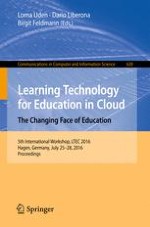2016 | OriginalPaper | Buchkapitel
Establishing Meta-Learning Metrics When Programming Mindstorms EV3 Robots
verfasst von : Michael Vallance
Erschienen in: Learning Technology for Education in Cloud – The Changing Face of Education
Aktivieren Sie unsere intelligente Suche, um passende Fachinhalte oder Patente zu finden.
Wählen Sie Textabschnitte aus um mit Künstlicher Intelligenz passenden Patente zu finden. powered by
Markieren Sie Textabschnitte, um KI-gestützt weitere passende Inhalte zu finden. powered by
Abstract
 - Reflect) to build and program robots to solve systematic problems. This paper will demonstrate that learners actively engaged in iteratively challenging robot-mediated interactive tasks can develop generic, declarative and epistemic competencies, with a consequential development of meta-learning.
- Reflect) to build and program robots to solve systematic problems. This paper will demonstrate that learners actively engaged in iteratively challenging robot-mediated interactive tasks can develop generic, declarative and epistemic competencies, with a consequential development of meta-learning.